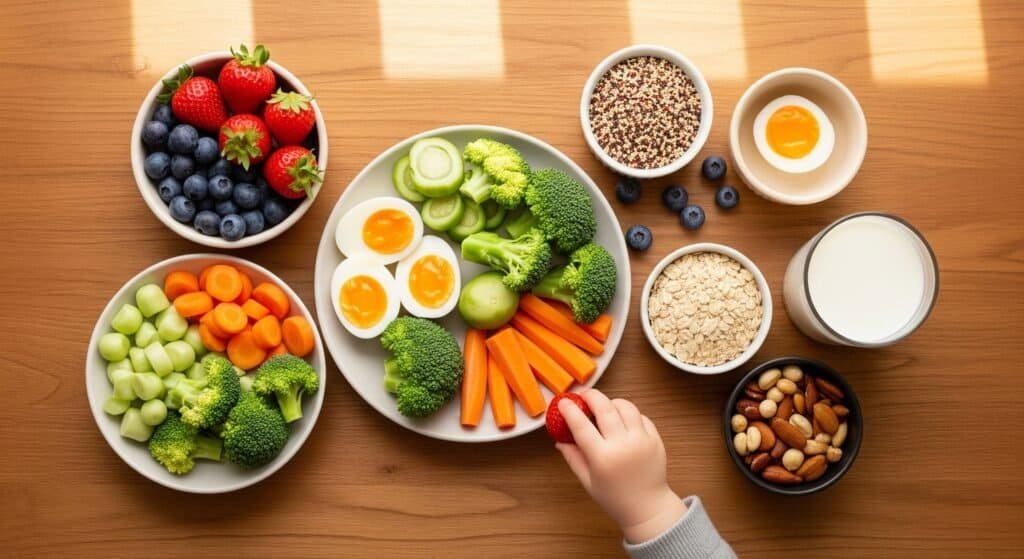By Dr. Prathyusha L.L – Pediatrician at Prathyusha Child Care, KPHB, Hyderabad
A child’s growth in the first five years is rapid and crucial. What they eat during this time can shape their health for life. Good nutrition supports brain development, immunity, physical growth, and energy levels. But many parents ask—what should my child eat every day?
If you are a parent of a toddler or preschooler, this blog is for you. As the best pediatrician in KPHB, I regularly guide families on how to ensure their child’s daily diet is balanced and age-appropriate.
Let’s break down the top nutrition list every parent should follow for children aged 1 to 5 years.

Understanding the Basics
Children between the ages of 1 to 5 years need food that supports their physical, mental, and emotional growth.
Their stomachs are small, so meals need to be nutrient-dense—packed with vitamins, minerals, proteins, and good fats in small servings.
Parents often consult a pediatrician in KPHB when their child is a picky eater or frequently falls sick. Most of the time, improving nutrition helps resolve these concerns.
1. Whole Grains and Carbohydrates
Carbohydrates provide energy for active toddlers.
Include:
- Rice
- Whole wheat roti or chapati
- Oats
- Idli, dosa
- Poha, upma
Avoid sugary cereals and processed snacks. Healthy carbs keep your child full and energetic throughout the day.
The best pediatrician hospital in KPHB will always recommend homemade food over packaged alternatives.
2. Protein-Rich Foods
Protein supports muscle development and builds immunity.
Include:
- Moong dal, toor dal
- Eggs (if not allergic)
- Paneer, tofu
- Chicken, fish (if non-vegetarian)
- Sprouts and pulses
Parents often ask us at our Hyderabad pediatric hospital if vegetarian diets are enough. With a good mix of dals, nuts, and dairy, they are.
3. Fruits and Vegetables
Vitamins, minerals, and fiber from fruits and vegetables are essential.
Give your child:
- Bananas, apples, papaya, mango
- Carrots, spinach, sweet potato
- Seasonal vegetables in curries, soups, or parathas
Try serving fruits as snacks and vegetables in colorful forms. Encourage variety and don’t worry if they refuse some—it’s part of learning.
As the best pediatrician in KPHB Hyderabad, I suggest offering the same food in different textures and shapes to increase acceptance.
4. Dairy and Calcium-Rich Foods
Calcium is important for healthy bones and teeth.
Include:
- Milk (2–3 cups per day)
- Yogurt (curd)
- Cheese or paneer
- Ragi (finger millet)
Children who dislike milk can still meet calcium needs through curd and ragi-based dishes.
A good pediatrician in KPHB can also check for signs of calcium deficiency if you’re concerned about poor appetite or dental issues.
5. Healthy Fats
Fats support brain development and keep your child full between meals.
Healthy fat sources:
- Ghee (in small amounts)
- Coconut oil, olive oil
- Groundnuts, almonds (powdered or in paste form)
- Avocados
Avoid fried snacks and fast food. Instead, prepare home-cooked meals using natural oils in moderation.
The best pediatrician hospital in KPHB always encourages balanced fat intake, not fat-free diets for toddlers.
6. Water and Fluids
Hydration is often overlooked.
Give plenty of:
- Water
- Coconut water
- Buttermilk
- Homemade soups
Limit sugary juices and aerated drinks. Water should be the main drink between meals.
As a trusted Hyderabad pediatric hospital, we’ve seen many cases of constipation and poor digestion due to inadequate fluid intake.
How Many Meals Should a Child Eat?
Children aged 1–5 years should ideally eat:
- 3 main meals
- 2 to 3 healthy snacks in between
Instead of large portions, offer small, frequent meals.
Parents often consult the best pediatrician in KPHB when children skip meals. In most cases, children need time, not pressure. Let them explore food at their own pace.
Dealing with Fussy Eating
Fussy eating is common. Keep offering different foods. Don’t force-feed.
Tips:
- Eat together as a family
- Make meals colorful and fun
- Be patient with new foods
- Avoid distractions like screens during meals
If your child is losing weight, falling ill often, or not growing well, consult a pediatrician in KPHB Hyderabad for a growth and nutrition check-up.
When to Visit a Pediatrician for Nutrition Advice
- If your child has poor appetite
- If they are not gaining enough weight or height
- If they are frequently constipated or tired
- If you need a customized meal plan
At Prathyusha Child Care, we work with parents to create realistic, balanced diet plans for young children. As a trusted name among the best pediatricians in KPHB, we believe good nutrition is the foundation of lifelong health.
Final Thoughts
Nutrition during the first five years is an investment in your child’s future. Small, healthy habits now can lead to strong immunity, better learning, and overall growth.
If you’re looking for the best pediatrician hospital in KPHB or a reliable Hyderabad pediatric hospital, we invite you to visit Prathyusha Child Care for personalized guidance and expert pediatric support.
Clinic Address:
Prathyusha Child Care
Plot No. 55 & 56, Near Hi-Tec City MMTS Station, 7th Phase, Kukatpally, Hyderabad, Telangana 500072
📞 Call: 91000 42541
🌐 www.prathyushachildcare.com
